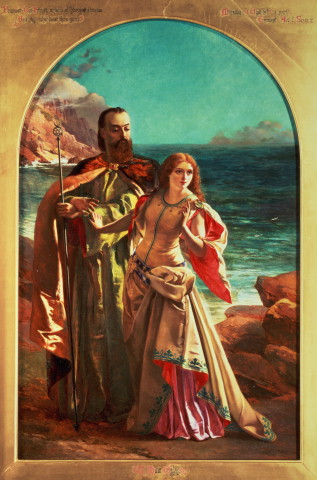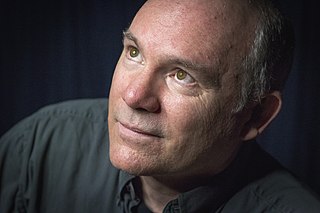
John William Polidori was a British writer and physician. He is known for his associations with the Romantic movement and credited by some as the creator of the vampire genre of fantasy fiction. His most successful work was the short story "The Vampyre" (1819), the first published modern vampire story. Although the story was at first erroneously credited to Lord Byron, both Byron and Polidori affirmed that the author was Polidori.

Prospero is a fictional character and the protagonist of William Shakespeare's play The Tempest. Prospero is the rightful Duke of Milan, whose usurping brother, Antonio, had put him to sea on a "rotten carcass" of a boat to die, twelve years before the play begins. Prospero and Miranda had survived and found exile on a small island. He has learned sorcery from books, and uses it while on the island to protect Miranda and control the other characters.
This article contains information about the literary events and publications of 1810.

Frankenstein's monster or Frankenstein's creature, also commonly known as Frankenstein, is a fictional character who first appeared in Mary Shelley's 1818 novel Frankenstein; or, The Modern Prometheus as the main antagonist. Shelley's title thus compares the monster's creator, Victor Frankenstein, to the mythological character Prometheus, who fashioned humans out of clay and gave them fire.

The Cenci. A Tragedy, in Five Acts (1820) is a verse drama in five acts by Percy Bysshe Shelley written in the summer of 1819, and inspired by a real Roman family, the House of Cenci. Shelley composed the play in Rome and at Villa Valsovano near Livorno, from May to August 5, 1819. The work was published by Charles and James Ollier in London in 1819. The Livorno edition was printed in Livorno, Italy by Shelley himself in a run of 250 copies. Shelley told Thomas Love Peacock that he arranged for the printing himself because in Italy "it costs, with all duties and freightage, about half of what it would cost in London." Shelley sought to have the play staged, describing it as "totally different from anything you might conjecture that I should write; of a more popular kind... written for the multitude." Shelley wrote to his publisher Charles Ollier that he was confident that the play "will succeed as a publication." A second edition appeared in 1821, his only published work to go into a second edition during his lifetime.

Victor Frankenstein is a fictional character and the main protagonist and title character in Mary Shelley's 1818 novel, Frankenstein; or, The Modern Prometheus. He is a Swiss scientist who, after studying chemical processes and the decay of living things, gains an insight into the creation of life and gives life to his own creature. Victor later regrets meddling with nature through his creation, as he inadvertently endangers his own life and the lives of his family and friends when the creature seeks revenge against him. He is first introduced in the novel when he is seeking to catch the monster near the North Pole and is saved from near death by Robert Walton and his crew.
David John Threlfall is an English stage, film and television actor and director. He is best known for playing Frank Gallagher in Channel 4's series Shameless. He has also directed several episodes of the show. In April 2014, he portrayed comedian Tommy Cooper in a television film entitled Tommy Cooper: Not Like That, Like This. In 2014, he starred alongside Jude Law in the thriller Black Sea. In 2022, he was nominated for the Tony Award for Best Leading Actor in a Play for his performance in the Martin McDonagh play Hangmen.
Seana McKenna is a Canadian actress primarily associated with stage roles at the Stratford Shakespeare Festival.

Zastrozzi: A Romance is a Gothic novel by Percy Bysshe Shelley first published in 1810 in London by George Wilkie and John Robinson anonymously, with only the initials of the author's name, as "by P.B.S.". The first of Shelley's two early Gothic novellas, the other being St. Irvyne, outlines his atheistic worldview through the villain Zastrozzi and touches upon his earliest thoughts on irresponsible self-indulgence and violent revenge. An 1810 reviewer wrote that the main character "Zastrozzi is one of the most savage and improbable demons that ever issued from a diseased brain".
Susan Hogan is a Canadian film, television and stage actress.
Richard Charles Roberts is a Canadian actor. He is known for his work in various films and television.

Theatre of United Kingdom plays an important part in British culture, and the countries that constitute the UK have had a vibrant tradition of theatre since the Renaissance with roots going back to the Roman occupation.

Frankenstein; or, The Modern Prometheus is an 1818 novel written by English author Mary Shelley. Frankenstein tells the story of Victor Frankenstein, a young scientist who creates a sapient creature in an unorthodox scientific experiment. Shelley started writing the story when she was 18, and the first edition was published anonymously in London on 1 January 1818, when she was 20. Her name first appeared in the second edition, which was published in Paris in 1821.

Percy Bysshe Shelley was a British writer who is considered as one of the major English Romantic poets. A radical in his poetry as well as in his political and social views, Shelley did not achieve fame during his lifetime, but recognition of his achievements in poetry grew steadily following his death, and he became an important influence on subsequent generations of poets, including Robert Browning, Algernon Charles Swinburne, Thomas Hardy, and W. B. Yeats. American literary critic Harold Bloom describes him as "a superb craftsman, a lyric poet without rival, and surely one of the most advanced sceptical intellects ever to write a poem."

St. Irvyne; or, The Rosicrucian: A Romance is a Gothic horror novel written by Percy Bysshe Shelley in 1810 and published by John Joseph Stockdale in December of that year, dated 1811, in London anonymously as "by a Gentleman of the University of Oxford" while the author was an undergraduate. The main character is Wolfstein, a solitary wanderer, who encounters Ginotti, an alchemist of the Rosicrucian or Rose Cross Order who seeks to impart the secret of immortality. The book was reprinted in 1822 by Stockdale and in 1840 in The Romancist and the Novelist's Library: The Best Works of the Best Authors, Vol. III, edited by William Hazlitt. The novella was a follow-up to Shelley's first prose work, Zastrozzi, published earlier in 1810. St. Irvyne was republished in 1986 by Oxford University Press as part of the World's Classics series along with Zastrozzi and in 2002 by Broadview Press.

Roald Dahl's Matilda, also known simply as Matilda and Matilda the Musical, is a musical with music and lyrics by Tim Minchin and a book by Dennis Kelly. It is based on the 1988 novel Matilda by Roald Dahl. The musical's narrative centres on Matilda Wormwood, a precocious five-year-old girl with the gift of telekinesis, who loves reading, overcomes obstacles caused by her family and school, and helps her teacher to reclaim her life. After a twelve-week trial run staged by the Royal Shakespeare Company (RSC) at Stratford-upon-Avon from November 2010 to January 2011, it received its West End premiere on 24 November 2011 at the Cambridge Theatre and its Broadway premiere on 11 April 2013 at the Shubert Theatre.

Original Poetry by Victor and Cazire was a poetry collection written by Percy Bysshe Shelley and his sister Elizabeth which was printed by Charles and William Phillips in Worthing and published by John Joseph Stockdale in September 1810. The work was Shelley's first published volume of poetry. Shelley wrote the poems in collaboration with his sister Elizabeth. The poems were written before Shelley entered the University of Oxford.

Robert Bockstael is a Canadian actor, director and writer.

Zastrozzi, A Romance is a 1986 four-part British television miniseries starring Tilda Swinton, Mark McGann, and Max Wall based on Percy Bysshe Shelley's 1810 eponymous Gothic horror novel. It was produced by Channel Four Films and shown on Channel 4 in the UK and on PBS in the U.S.

Since the initial publication of Mary Wollstonecraft Shelley's novel Frankenstein; or, The Modern Prometheus in 1818, there has existed uncertainty about the extent to which Mary Shelley's husband, Percy Bysshe Shelley, contributed to the text. Whilst the novel was conceived and mainly written by Mary, Percy is known to have provided input in editing and publishing the manuscript. Some critics have alleged that Percy had a greater role—even the majority role—in the creation of the novel, though mainstream scholars have generally dismissed these claims as exaggerated or unsubstantiated. Based on a transcription of the original manuscript, it is currently believed that Percy contributed between 4,000 and 5,000 words to the 72,000 word novel.
















